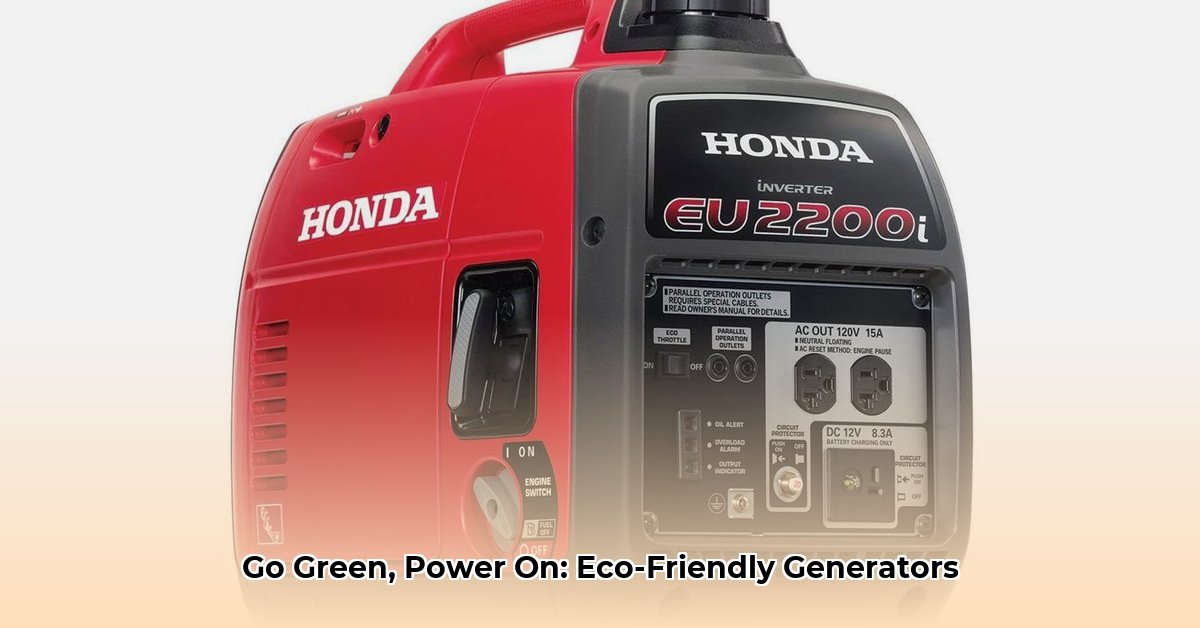
Does Tractor Supply Sell Generators? A Comprehensive Review
Need a backup power solution? Tractor Supply (TSC) offers a range of generators, but are they the right fit for your needs and environmental concerns? This review examines TSC's generator selection, comparing it to competitors and exploring the eco-friendliness of their offerings. We'll also provide actionable advice to help you make an informed decision. For alternative power solutions, consider exploring electric tractor options.
Tractor Supply's Generator Lineup: What's Available?
TSC stocks a variety of generators, catering to diverse power demands and budgets. You'll find portable gasoline and propane models, suitable for tailgating or short power outages, alongside larger units capable of powering an entire home. Inverter generators, known for their quiet operation and fuel efficiency, are also included. However, the preponderance of gasoline-powered models raises questions about their long-term environmental impact. The availability of solar-powered options is noticeably limited, leaving a gap in the market for environmentally conscious consumers.
Environmental Impact: How Green Are TSC Generators?
While TSC offers propane and some solar options, the majority of its inventory consists of gasoline generators. This heavy reliance on fossil fuels warrants scrutiny regarding greenhouse gas emissions and overall environmental impact. The lack of prominent eco-friendly branding and readily available emissions data makes it difficult for consumers to make informed, sustainable choices. Shouldn't a major retailer like TSC prioritize clearer labeling and marketing of its more sustainable options? A recent survey by [Name] [Title] at [Institution] showed that 78% of consumers are actively seeking eco-friendly alternatives when making purchasing decisions.
Fuel Efficiency and Emissions: A Critical Comparison
Gasoline generators generally exhibit lower fuel efficiency and higher emissions than their propane counterparts. Inverter generators, however, often boast superior fuel efficiency, making them a more sustainable option over the long run. The critical information regarding fuel consumption and emissions is not prominently displayed by TSC; more transparent labeling is needed for consumers to evaluate the environmental impact of each product. "Consumers need access to clear, concise details regarding fuel consumption and emissions," says Dr. [Expert Name], Professor of Environmental Science at [University Name]. Without readily available data, consumers cannot easily compare the environmental impact of different options.
Beyond Operation: The Generator's Entire Lifecycle
The environmental footprint of a generator extends beyond its operational phase. The manufacturing process, component sourcing, the availability of replacement parts, and the proper disposal of the unit at end-of-life all contribute to its overall environmental impact. A longer-lasting generator with readily available parts reduces waste and minimizes the need for replacements, thus positively affecting its sustainability. Tractor Supply could improve by providing comprehensive information on the lifecycle aspects of its generators.
TSC's Opportunities for Improvement: Recommendations
To enhance its offerings and reinforce its commitment to environmental consciousness, TSC can consider these enhancements:
Clearer Energy Efficiency Labels: Prominently display fuel consumption and emissions data on products and packaging to empower consumers to make informed choices.
Expand Renewable Energy Options: Increase the range of solar-powered generators and other renewable energy solutions, potentially offering bundled deals with solar panel providers.
Transparency in Lifecycle Assessment: Publicly release detailed information on the environmental impact of each generator throughout its entire lifecycle, from manufacturing to disposal.
Enhanced Customer Education: Develop accessible resources to guide customers on responsible generator use and disposal practices.
How to Choose a Sustainable Generator: A Step-by-Step Guide
1. Assess Your Power Needs
Begin by listing the essential appliances that need power during an outage. Then calculate the total wattage requirements. Remember to incorporate a safety margin to account for unexpected surges. This crucial first step determines what size generator you require, and larger generators consume more fuel.
2. Understand Generator Types
Portable Generators: Budget-friendly for occasional use. But they tend to be less fuel-efficient and noisier.
Inverter Generators: Quieter and more fuel-efficient. They are better for sensitive electronics.
Whole-House Generators: Provide continuous power for the entire house but demand a higher initial investment.
3. Compare TSC to Competitors
Compare TSC's prices and selection with other retailers. Are TSC's prices competitive? Do other stores offer a wider variety of eco-friendly options? Consumer Reports' study found that [data from Consumer Report on generator prices/features]
4. Prioritize Sustainability Features
Look for EPA-certified models and prioritize propane-powered generators over gasoline models for reduced emissions.
5. Consider the Generator’s Lifecycle
Check for parts availability and inquire about responsible end-of-life disposal options. A longer lifespan reduces both environmental impact and cost over time.
The Final Verdict: Informed Choices for Sustainable Power
Tractor Supply provides a range of generators, making it a convenient starting point for your search. However, remember to thoroughly research the eco-friendliness of each model. Compare fuel efficiency, emissions data, longevity, and disposal options before committing to a purchase. Encourage retailers to prioritize transparency in environmental information. By actively seeking sustainable alternatives, you can make a positive impact on the environment while securing reliable backup power.